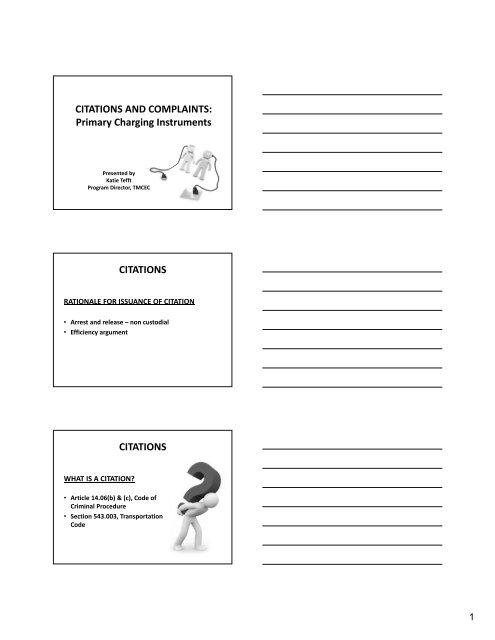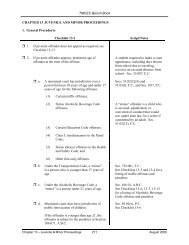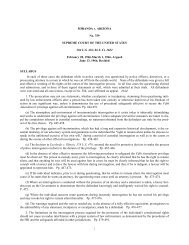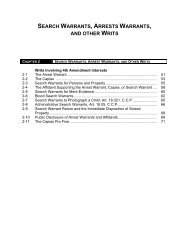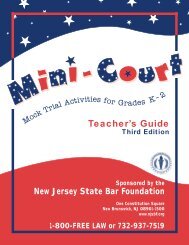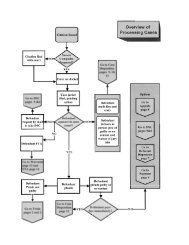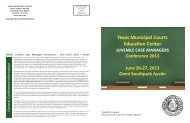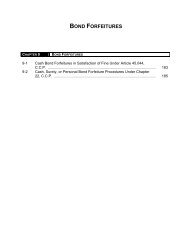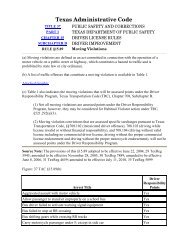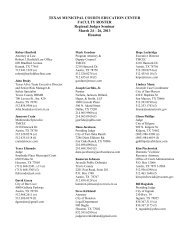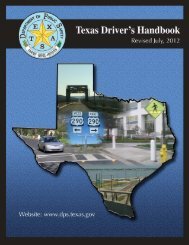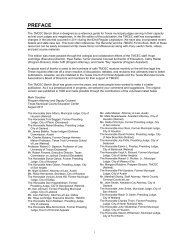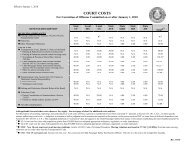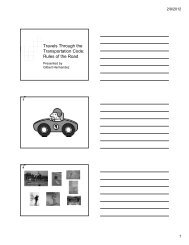Citations and Complaints BINDER.pdf - Texas Municipal Courts ...
Citations and Complaints BINDER.pdf - Texas Municipal Courts ...
Citations and Complaints BINDER.pdf - Texas Municipal Courts ...
Create successful ePaper yourself
Turn your PDF publications into a flip-book with our unique Google optimized e-Paper software.
CITATIONS AND COMPLAINTS:<br />
Primary Charging Instruments<br />
Presented by<br />
Katie Tefft<br />
Program Director, TMCEC<br />
CITATIONS<br />
RATIONALE FOR ISSUANCE OF CITATION<br />
• Arrest <strong>and</strong> release –non custodial<br />
• Efficiency argument<br />
CITATIONS<br />
WHAT IS A CITATION<br />
• Article 14.06(b) & (c), Code of<br />
Criminal Procedure<br />
• Section 543.003, Transportation<br />
Code<br />
1
CITATIONS<br />
WHO CAN ISSUE A CITATION<br />
• A peace officer – Article 14.06<br />
• Any peace officer –Section 543.001<br />
CITATIONS<br />
WHEN IS ISSUANCE OF CITATION AND “ARREST<br />
AND RELEASE” REQUIRED<br />
SPEEDING <strong>and</strong> OPEN CONTAINER OF ALCOHOL IN VEHICLE,<br />
if person makes written promise to appear<br />
Section 543.004, Transportation Code<br />
CITATIONS<br />
WHAT IF PERSON REFUSES TO SIGN WRITTEN<br />
PROMISE TO APPEAR<br />
Section 543.005, TTC<br />
“To secure release, the person arrested must make a<br />
written promise to appear in court by signing the written<br />
notice prepared by the arresting officer…The officer shall<br />
then promptly release the person from custody.”<br />
See Berrett v. State, 152 S.W.3d 600 (Tex. App.—Houston [1 st Dist.] 2004, pet. ref’d)<br />
<strong>and</strong> Sedani v. State, 848 S.W.2d 314 (Tex. App.—Houston [1 st Dist.] 1993, pet. ref’d)<br />
2
CITATION REQUIREMENTS<br />
1. NAME AND ADDRESS OF PERSON CHARGED<br />
CITATION REQUIREMENTS<br />
2. OFFENSE CHARGED<br />
Specifics for speeding –Section 543.010, Transportation<br />
Code<br />
Must state applicable speed limit <strong>and</strong> “clocked” speed<br />
“The complaint <strong>and</strong> the summons or notice to appear on a<br />
charge of speeding under this subtitle must specify: (1)<br />
the maximum or minimum speed limit applicable in the<br />
district or at the location, <strong>and</strong> (2) the speed at which the<br />
defendant is alleged to have driven.”<br />
CITATION REQUIREMENTS<br />
3. TIME AND PLACE OF APPEARANCE<br />
Specifics for Rules of the Road violations –Section 543.006,<br />
Transportation Code<br />
At least 10 days after date of arrest, unless the person<br />
dem<strong>and</strong>s an earlier hearing<br />
Before a magistrate having jurisdiction of offense who is in<br />
municipality or county in which offense is alleged to have<br />
occurred<br />
Remember “Mailbox Rule” – Article 45.013, TCCP<br />
3
OTHER CITATION REQUIREMENTS<br />
4. LICENSE NUMBER OF VEHICLE (if applicable)<br />
Section 543.003, Transportation Code<br />
Only required if applicable for Rules of the Road violations<br />
OTHER CITATION REQUIREMENTS<br />
5. NOTICE TO APPEAR: COMMERCIAL VEHICLE OR<br />
LICENSE<br />
Section 543.007, Transportation Code<br />
“A notice to appear issued to the operator of a commercial motor or<br />
holder of a commercial driver’s license or commercial driver learner’s<br />
permit, for the violation of a law regulating the operating of vehicles on<br />
highways, must contain the information required by department rule to<br />
comply with Chapter 522 <strong>and</strong> the federal Commercial Motor Vehicle<br />
Safety Act of 1986.”<br />
‐ whether the vehicle was a CMV as defined in <strong>Texas</strong> Transportation Code, Chapter 522;<br />
‐ whether the vehicle was involved in the transporting of hazardous materials;<br />
‐ the date <strong>and</strong> nature of the offense, including whether the offense was a serious traffic<br />
violation as defined in <strong>Texas</strong> Transportation Code, Chapter 522<br />
Look at <strong>Texas</strong> Administrative Code 16.100 for special form<br />
CITATION REQUIREMENTS<br />
6. NOTICE OF FIREARM ISSUE FOR<br />
MISDEMEANOR DOMESTIC VIOLENCE<br />
CONVICTION<br />
Article 14.06(b), Code of Criminal Procedure<br />
“If you are convicted of a misdemeanor offense involving violence where<br />
you are or were a spouse, intimate partner, parent, or guardian of the<br />
victim or are or were involved in another, similar relationship with the<br />
victim, it may be unlawful for you to possess or purchase a firearm,<br />
including a h<strong>and</strong>gun or long gun, or ammunition, pursuant to federal<br />
law under 18 U.S.C. Section 922(g)(9) or Section 46.04(b), <strong>Texas</strong> Penal<br />
Code. If you have any questions whether these laws make it illegal for<br />
you to possess or purchase a firearm, you should consult an attorney.”<br />
4
OTHER REQUIRED INFORMATION<br />
• Notice of right to driving safety course or motorcycle<br />
operators course (Article 45.0511, Transportation Code)<br />
• Notice of potential surcharge (Section 708.105,<br />
Transportation Code)<br />
• Notice of potential suspension for FMFR conviction (Section<br />
601.233, Transportation Code)<br />
• Notice of contract for denial of vehicle registration renewal<br />
for enforcement of certain arrest warrants (Scofflaw<br />
program) (Section 702.004, Transportation Code)<br />
• Notice of contract for denial of driver’s license renewal for<br />
failure to appear or failure to pay (OmniBase program)<br />
(Section 706.003, Transportation Code)<br />
ADDITIONAL “PRACTICAL”<br />
REQUIREMENTS<br />
DATA FOR RACIAL PROFILING<br />
Article 2.132(b)(6), TCCP<br />
“Each law enforcement agency in this state shall adopt a<br />
detailed written policy on racial profiling. The policy must:<br />
(6) require collection of information relating to motor vehicle<br />
stops in which a citation is issued <strong>and</strong> to arrests made as a<br />
result of those stops, including information relating to:<br />
(a) the race or ethnicity of the individual detained;<br />
(b) whether a search was conducted <strong>and</strong>, if so, whether<br />
the individual detained consented to the search; <strong>and</strong><br />
(c) whether the peace officer knew the race or ethnicity<br />
of the individual before detaining that individual… .”<br />
May a peace officer issue a<br />
citation for the offense of public<br />
intoxication<br />
YES<br />
NO<br />
‐ Article 14.031, Code of Criminal Procedure<br />
5
When can a peace officer issue a<br />
citation<br />
‐ Articles 14.01 & 14.03, Code of Criminal Procedure<br />
PLEA OPTIONS FOR CITATION<br />
(Article 27.14(d), Code of Criminal Procedure)<br />
CITATION<br />
ONLY<br />
GUILTY<br />
NO<br />
CONTEST<br />
What if defendant pleas not guilty<br />
COMPLAINTS<br />
PURPOSE OF FORMAL, SWORN COMPLAINT<br />
Article 45.018(a), Code of Criminal Procedure<br />
“For purposes of this chapter, a complaint is a sworn allegation<br />
charging the accused with the commission of an offense.”<br />
A complaint notifies a defendant of the offense charged so that he<br />
or she may prepare a defense. Kindley v. State, 879 S.W.2d 261<br />
(Tex.App.—Austin 1982, pet. ref’d)<br />
6
COMPLAINTS<br />
CITATION –INTERIM CHARGING INSTRUMENT<br />
Article 27.14(d), TCCP<br />
“(d) If written notice of an offense for which maximum<br />
possible punishment is by fine only…has been prepared,<br />
delivered, <strong>and</strong> filed with the court <strong>and</strong> a legible duplicate<br />
copy has been given to the defendant, the written notice to<br />
appear serves as a complaint to which the defendant may<br />
plead ‘guilty,’ ‘not guilty,’ or ‘nolo contendere.’”<br />
See State v. Shaw, 822 S.W.2d 807 (Tex.App.—Austin 1992)<br />
COMPLAINTS<br />
WHEN MUST COMPLAINT BE FILED<br />
When “not guilty” plea entered OR defendant fails to appear –<br />
Article 27.14(d), TCCP<br />
“If the defendant pleads ‘not guilty’ to the offense or fails to appear<br />
based on the written notice, a complaint shall be filed that conforms to<br />
the requirements of Chapter 45 of this code, <strong>and</strong> that complaint serves<br />
as an original complaint.”<br />
The “or fails to appear” language was added by amendment in 2009.<br />
COMPLAINTS<br />
WHO CAN FILE A COMPLAINT<br />
• A peace officer<br />
• A code enforcement officer<br />
• A citizen<br />
• Anyone<br />
7
COMPLAINTS<br />
FILING OF FORMAL COMPLAINT MAY BE WAIVED<br />
Article 27.14(d), Code of Criminal Procedure<br />
“A defendant may waive the filing of a sworn complaint <strong>and</strong> elect<br />
that the prosecution proceed on the written notice of the charged<br />
offense if the defendant agrees in writing with the prosecution,<br />
signs the agreement, <strong>and</strong> files it with the court.”<br />
STATUTE OF LIMITATIONS<br />
COMPLAINTS<br />
Article 12.02(b), Code of Criminal Procedure<br />
“A complaint or information for any Class C misdemeanor<br />
may be presented within 2 years from the date of the<br />
commission of the offense, <strong>and</strong> not afterward.”<br />
COMPLAINTS<br />
NOTICE TO DEFENDANT OF CONTENT OF COMPLAINT<br />
Article 45.018(b), Code of Criminal Procedure<br />
“A defendant is entitled to notice of a complaint against the<br />
defendant not later than the day before the date of any<br />
proceeding in the prosecution of the defendant under the<br />
complaint. The defendant may waive the right to notice<br />
granted by this subsection.”<br />
8
COMPLAINT REQUIREMENTS<br />
REQUIREMENTS OF COMPLAINT<br />
Article 45.019, Code of Criminal Procedure<br />
1. IN WRITING<br />
2. STATUTORY BEGINNING AND<br />
“In the Name <strong>and</strong> by<br />
the authority of the<br />
State of <strong>Texas</strong>…”<br />
7. ENDING<br />
“Against the peace <strong>and</strong> dignity<br />
of the State”<br />
“…<strong>and</strong> contrary to said ordinance.”<br />
COMPLAINT REQUIREMENTS<br />
REQUIREMENTS OF COMPLAINT<br />
3. NAME OF THE ACCUSED OR REASONABLE DEFINITE<br />
DESCRIPTION<br />
4. SHOW THAT THE ACCUSED HAS COMMITTED AN OFFENSE<br />
AGAINST THE LAW OF THIS STATE, OR STATE THAT THE<br />
AFFIANT HAS REASON TO BELIEVE AND DOES BELIEVE THAT<br />
THE ACCUSED HAS COMMITTED AN OFFENSE AGAINST THE<br />
LAW OF THE STATE<br />
COMPLAINT REQUIREMENTS<br />
ELEMENTS OF OFFENSE<br />
Each element necessary to constitute an offense must be alleged in<br />
the complaint. Villareal v. State, 729 S.W.2d 348 (Tex.App.—El Paso<br />
1987, no pet.)<br />
The complaint must negate any exception in the statute that the<br />
State is required to negate. Bird v. State, 927 S.W.2d 136 (Tex.App.—<br />
Austin 1982, pet. ref’d)<br />
9
COMPLAINT REQUIREMENTS<br />
LOCATION OF OFFENSE<br />
See Bedwell v. State, 155 S.W. 2d 930 (Tex. 1940) –certain types of<br />
charges can occur anywhere within a particular jurisdiction, <strong>and</strong>,<br />
therefore, it is not necessary that the complaint allege a specific location<br />
in those instances.<br />
All complaints filed in municipal court must allege that the violation<br />
occurred within the territorial limits of the municipality. Article<br />
45.019(c), TCCP<br />
NAME OF VICTIM, if applicable<br />
COMPLAINT REQUIREMENTS<br />
CULPABLE MENTAL STATE<br />
A complaint must allege the applicable culpable mental state, if one is<br />
required for the offense. The statutory culpable mental states are, from<br />
highest to lowest, (1) intentional, (2) knowing, (3) reckless, <strong>and</strong> (4)<br />
criminal negligence. Section 6.02, Penal Code<br />
If the offense does not prescribe a culpable mental state, it must be<br />
intentionally, knowingly, or recklessly.<br />
Most traffic‐related offenses do not require a culpable mental state.<br />
Offenses charged under the <strong>Texas</strong> Transportation Code do not require<br />
pleading a culpable mental state in the complaint. Zulauf v. State, 591 S.<br />
W. 2d 869 (Tex. Crim. App. 1979)<br />
“A person commits an offense if the person performs an act prohibited<br />
or fails to perform an act required by this subtitle.” Article 542.301,<br />
Transportation Code<br />
COMPLAINT REQUIREMENTS<br />
MANNER AND MEANS OF OFFENSE<br />
“Manner” is the way, mode, or method of doing something. “Means” is<br />
how the end is achieved. If the complaint does not properly allege the<br />
manner <strong>and</strong> means it is defective because the defendant has not been<br />
provided notice of how the offense is alleged to have been committed.<br />
Haecker v. State, 571 S.W.2d 920 (Tex. Crim. App. 1978).<br />
A charging instrument must be specific enough to inform the accused of<br />
the nature of the allegations so that he may prepare a defense. State v.<br />
Moff, 154 S.W.3d 599 (Tex.Crim.App. 2004). However, although a<br />
complaint alleging a Class C misdemeanor must state facts sufficient to<br />
show commission of the offense charged, it need not show the same<br />
particularity or specificity as is necessary in an information or<br />
indictment. Vallejo v. State, 408 S.W.2d 113 (Tex.Crim.App. 1966)<br />
10
COMPLAINT REQUIREMENTS<br />
MANNER AND MEANS CONTINUED<br />
If the definition of an offense allows or provides for more than one<br />
manner or means by which a violation may occur, then fair notice to the<br />
defendant requires that the State allege in the charging instrument the<br />
particular manner <strong>and</strong> means it will seek to establish. Gowin v. State,<br />
S.W.2d 672 (Tex.App.—Tyler 1988, no pet.)<br />
COMPLAINT REQUIREMENTS<br />
REQUIREMENTS OF<br />
5. DATE OF OFFENSE<br />
COMPLAINT REQUIREMENTS<br />
REQUIREMENTS OF COMPLAINT<br />
6. SWORN AND SIGNED<br />
• “Personal knowledge” affiant v. “hearsay” affiant<br />
• Signature or mark<br />
• Rubber stamped signature or electronic signature<br />
Who can a complaint be sworn to before (a/k/a the jurat)<br />
• Article 45.019(d) & (e), Code of Criminal Procedure<br />
• Section 602.002, Government Code<br />
Not signed = defective complaint<br />
11
COMPLAINTS<br />
COURT SEAL<br />
“A justice or municipal court shall have a<br />
court seal, the impression of which<br />
must be on all papers issued out of<br />
the court except subpoenas…”<br />
‐ Article 45.012(g), Code of<br />
Criminal Procedure<br />
Court of Record requires<br />
“<strong>Municipal</strong> Court of/in _______, <strong>Texas</strong>”<br />
COMPLAINTS<br />
WAIVER OF DEFECTS IN COMPLAINT<br />
Article 45.019(f), Code of Criminal Procedure<br />
“If the defendant does not object to the defect, error, or<br />
irregularity of form or substance in a charging instrument<br />
before the date on which the trial on the merits commences,<br />
the defendant waives <strong>and</strong> forfeits the right to object to the<br />
defect, error, or irregularity. Nothing in this article prohibits<br />
a trial court from requiring that an objection to a charging<br />
instrument be made at an earlier time.”<br />
COMPLAINTS<br />
CHALLENGE OF COMPLAINT<br />
It is the defendant’s burden to prove a complaint is defective.<br />
Bagsby v. State, 721 S.W.2d 567 (Tex.App.—Fort Worth 1986, no<br />
pet)<br />
The customary means by which the sufficiency of a complaint is<br />
challenged is a motion to set aside or “quash” the complaint.<br />
12
COMPLAINTS<br />
AMENDMENT OF COMPLAINT<br />
Because a complaint is a sworn document, it can be “amended”<br />
only if the amended complaint is “re‐sworn” by the affiant.<br />
Cannon v. State, 925 S.W.2d 126 (Tex.App.—Amarillo 1996, pet.<br />
ref’d)<br />
CITATION VS. COMPLAINT<br />
CITATION<br />
• Date of Offense<br />
• Name of Accused<br />
• Offense Committed<br />
• Location Where Offense<br />
Committed<br />
• Signed by Officer<br />
• Signed by Defendant<br />
• Due Date<br />
COMPLAINT<br />
• Date of Offense<br />
• Name of Accused<br />
• Offense Charged<br />
• Location Where Offense<br />
Committed<br />
• Signed by Officer<br />
• Not Signed by Defendant<br />
• No Due Date<br />
• SWORN TO BY OFFICIAL<br />
Thank you!<br />
13
CITATIONS AND COMPLAINTS<br />
Paper Prepared by<br />
Andy Bradshaw<br />
Judge<br />
City of Fort Worth<br />
Adapted by<br />
Joseph Gorfida, Jr.<br />
Partner<br />
Nichols, Jackson, Dillard, Hager & Smith, LLP<br />
<strong>and</strong><br />
Katie Tefft<br />
Program Director<br />
TMCEC
CITATIONS<br />
RATIONALE FOR ISSUANCE OF CITATION<br />
“FACILITATES ARREST AND RELEASE WITH OBLIGATION TO APPEAR AT<br />
A LATER DATE AND AVOIDS FULL CUSTODIAL ARREST.”<br />
WHEN IS ISSUANCE OF CITATION AND “ARREST AND<br />
RELEASE” REQUIRED<br />
SPEEDING <strong>and</strong> OPEN CONTAINER OF ALCOHOL IN VEHICLE, if person<br />
makes written promise to appear – Section 543.004, <strong>Texas</strong><br />
Transportation Code (“TTC”)<br />
WHAT IF PERSON REFUSES TO SIGN WRITTEN PROMISE<br />
TO APPEAR<br />
<br />
Section 543.005, TTC<br />
“To secure release, the person arrested must make a written<br />
promise to appear in court by signing the written notice prepared<br />
by the arresting officer…The officer shall then promptly release the<br />
person from custody.”<br />
<br />
See Berrett v. State, 152 S.W.3d 600 (Tex. App.—Houston [1 st<br />
Dist.] 2004, pet. ref’d) – “…before an officer may issue a citation<br />
<strong>and</strong> release a defendant charged with violating the Transportation<br />
Code, the defendant must also sign a promise to appear before a<br />
magistrate. Only then does the officer have a duty to release the<br />
defendant from custody. If the defendant does not promise to<br />
appear, the officer is under no duty to release him. Instead, the<br />
officer could choose to take the defendant immediately before a<br />
magistrate. To secure a release for a violation of the<br />
Transportation Code, the defendant must sign a promise to appear.<br />
Once he does so, ‘the officer shall then promptly release the person<br />
from custody.’” (emphasis original)<br />
1
See Sedani v. State, 848 S.W.2d 314 (Tex. App –Houston [1 st<br />
Dist.] 1993, pet. ref’d) – Officer pulls driver over for turning<br />
without signal <strong>and</strong> irate driver asks officer what would happen if he<br />
refused to sign citation. Officer replied that he would be taken to<br />
jail. Driver yanks clipboard out of officer’s h<strong>and</strong>, signs citation, <strong>and</strong><br />
gives clipboard back to officer. Officer h<strong>and</strong>s driver copy of the<br />
citation, <strong>and</strong> driver promptly proceeds to rip it into shreds <strong>and</strong><br />
throw it on the ground. Officer receives authorization from his<br />
supervisor to make custodial arrest of driver. Gun found in driver’s<br />
car, <strong>and</strong> driver charged with unlawful possession of weapon. At<br />
trial driver alleges that weapon is poisonous fruit because officer<br />
had no right to re-arrest him after he signed promise to appear for<br />
traffic offense. The trial judge found that driver had negated his<br />
promise to appear by ripping citation up, <strong>and</strong> driver was convicted.<br />
Court of Appeals held that driver was illegally detained after he<br />
received his copy of the citation, even thought he ripped it to<br />
pieces <strong>and</strong> destroyed the information regarding the appearance<br />
obligation. The Court stated, “…there was no probable cause to<br />
hold him after he signed the promise to appear. Because the<br />
arrest that led police to the h<strong>and</strong>gun was illegal, the h<strong>and</strong>gun must<br />
be suppressed.” Reversed <strong>and</strong> rem<strong>and</strong>ed.<br />
CITATION REQUIREMENTS<br />
1. NAME AND ADDRESS OF PERSON CHARGED<br />
<br />
Section 543.003, TTC<br />
“An officer who arrests a person for a violation of this subtitle<br />
punishable as a misdemeanor <strong>and</strong> who does not take the person<br />
before a magistrate shall issue a written notice to appear in court<br />
showing the time <strong>and</strong> place the person is to appear, the offense<br />
charged, the name <strong>and</strong> address of the person charged, <strong>and</strong> if<br />
applicable, the license number of the person’s vehicle.”<br />
<br />
Article 14.06(b), <strong>Texas</strong> Code of Criminal Procedure (“TCCP”)<br />
“A peace officer who is charging a person, including a child, with<br />
committing an offense that is a Class C misdemeanor, other than<br />
an offense under Section 49.02, Penal Code, may, instead of taking<br />
the person before a magistrate, issue a citation to the person that<br />
contains written notice of the time <strong>and</strong> place the person must<br />
appear before a magistrate, the name <strong>and</strong> address of the person<br />
charged, the offense charged… .”<br />
2
2. OFFENSE CHARGED<br />
<br />
<br />
Section 543.003, TTC <strong>and</strong> Article 14.06(b), TCCP<br />
For speeding charge, citation must state applicable speed limit <strong>and</strong><br />
“clocked” speed (Section 543.010, TTC)<br />
“The complaint <strong>and</strong> the summons or notice to appear on a charge<br />
of speeding under this subtitle must specify: (1) the maximum or<br />
minimum speed limit applicable in the district or at the location,<br />
<strong>and</strong> (2) the speed at which the defendant is alleged to have<br />
driven.”<br />
3. TIME AND PLACE OF APPEARANCE<br />
<br />
<br />
Section 543.003, TTC <strong>and</strong> Article 14.06(b), TCCP<br />
At least 10 days to appear after date of arrest, before a magistrate<br />
having jurisdiction of offense who is in municipality or county in<br />
which offense is alleged to have occurred - Section 543.006(a),<br />
TTC<br />
“The time specified in the notice to appear must be at least 10<br />
days after the date of arrest unless the person arrested dem<strong>and</strong>s<br />
an earlier hearing.”<br />
<br />
Remember “Mailbox Rule” – Article 45.013, TCCP<br />
“(a) Notwithst<strong>and</strong>ing any other law, for the purposes of this<br />
chapter a document is considered timely filed with the clerk of the<br />
court if<br />
(1) the document is deposited with the United States<br />
Postal Service in a first class postage prepaid envelope<br />
properly addressed to the clerk or before the date the<br />
document is required to be filed with the clerk; <strong>and</strong><br />
(2) the clerk receives the document not later than the 10 th<br />
day after the date the document is required to be filed<br />
with the clerk;<br />
(b) A legible postmark affixed by the United States Postal Service<br />
is prima facie evidence of the date the document is deposited with<br />
the United States Postal Service.”<br />
3
4. LICENSE NUMBER OF VEHICLE (IF APPLICABLE)<br />
<br />
Section 543.003, TTC<br />
5. NOTICE OF POTENTIAL SUSPENSION<br />
<br />
Section 601.233(a), TTC<br />
“A citation for an offense under Section 601.191 issued as a result<br />
of Section 601.053 must include, in type larger than other type on<br />
the citation, except for the type of the statement required by<br />
Section 708.105…the following statement:<br />
“A second or subsequent conviction of an offense under the <strong>Texas</strong><br />
Motor Vehicle Safety Responsibility Act will result in the suspension<br />
of your driver’s license <strong>and</strong> motor vehicle registration unless you<br />
file <strong>and</strong> maintain evidence of financial responsibility with the<br />
Department of Public Safety for the two years from the date of<br />
conviction. The department may waive the requirement to file<br />
evidence of financial responsibility if you file satisfactory evidence<br />
with the department showing that at the time this citation was<br />
issued, the vehicle was covered by a motor vehicle liability<br />
insurance policy or that you were otherwise exempt from the<br />
requirements to provide evidence of financial responsibility.”<br />
6. NOTICE OF POTENTIAL SURCHARGE<br />
<br />
Section 708.105(a), TTC<br />
“A citation issued for an offense under a traffic law of this state or<br />
a political subdivision of this state must include, in type larger than<br />
any other type on the citation, the following statement:<br />
“A conviction of an offense under a traffic law of this state or a<br />
political subdivision of this state may result in the assessment on<br />
your driver’s license of a surcharge under the Driver Responsibility<br />
Program.”<br />
7. RIGHT TO DRIVING SAFETY COURSE OR MOTORCYCLE OPERATORS<br />
COURSE<br />
<br />
Article 45.0511(q), TCCP<br />
4
“A notice to appear issued for an offense to which this article<br />
applies must inform a defendant charged with an offense under<br />
Section 472.002, Transportation Code, <strong>and</strong> offense under Subtitle<br />
C, Title 7, Transportation Code, or an offense under Section<br />
729.001(a)(3), Transportation Code, committed while operating a<br />
motor vehicle of the defendant’s right to complete a driving safety<br />
course…motorcycle operator training course… .<br />
“You may be able to require that this charge be dismissed by<br />
successfully completing a driving safety course or a motorcycle<br />
operator training course. You will lose that right if, on or before<br />
your appearance date, you do not provide the court with notice of<br />
your request to take the course.”<br />
8. NOTICE OF FIREARM ISSUE FOR MISDEMEANOR DOMESTIC<br />
VIOLENCE CONVICTION<br />
<br />
Article 14.06(b), TCCP<br />
“If you are convicted of a misdemeanor offense involving violence<br />
where you are or were a spouse, intimate partner, parent, or<br />
guardian of the victim or are or were involved in another, similar<br />
relationship with the victim, it may be unlawful for you to possess<br />
or purchase a firearm, including a h<strong>and</strong>gun or long gun, or<br />
ammunition, pursuant to federal law under 18 U.S.C. Section<br />
922(g)(9) or Section 46.04(b), <strong>Texas</strong> Penal Code. If you have any<br />
questions whether these laws make it illegal for you to possess or<br />
purchase a firearm, you should consult an attorney.”<br />
9. NOTICE TO APPEAR: COMMERCIAL VEHICLE OR LICENSE<br />
<br />
Section 543.007, TTC<br />
“A notice to appear issued to the operator of a commercial motor<br />
vehicle or holder of a commercial driver’s license or commercial<br />
driver learner’s permit, for the violation of a law regulating the<br />
operating of vehicles on highways, must contain the information<br />
required by department rule to comply with Chapter 522 <strong>and</strong> the<br />
federal Commercial Motor Vehicle Safety Act of 1986.”<br />
(1) whether the vehicle was a CMV as defined in <strong>Texas</strong><br />
Transportation Code, Chapter 522;<br />
(2) whether the vehicle was involved in the transporting of<br />
hazardous materials;<br />
5
(3) the date <strong>and</strong> nature of the offense, including whether<br />
the offense was a serious traffic violation as defined in<br />
<strong>Texas</strong> Transportation Code, Chapter 522<br />
<br />
Section 16.100, <strong>Texas</strong> Administrative Code (“TAC”)<br />
“A conviction report resulting from a traffic citation issued to a<br />
person driving a commercial motor vehicle (CMV), or who is a<br />
holder of a commercial driver’s license or commercial driver’s<br />
learner’s permit, for violation of any law regulating the operation of<br />
motor vehicles on highways, must be on a form that contains the<br />
following information:<br />
1. the name, address, physical description, <strong>and</strong> date of birth of the<br />
party charged;<br />
2. the number, if any, of the person driver’s license;<br />
3. the registration number of the vehicle involved;<br />
4. whether the vehicle was a CMV as defined in <strong>Texas</strong><br />
Transportation Code, Chapter 522;<br />
5. whether the vehicle was involved in the transporting of<br />
hazardous materials;<br />
6. the date <strong>and</strong> nature of the offense, including whether the<br />
offense was a serious traffic violation as defined in <strong>Texas</strong><br />
Transportation Code, Chapter 522.”<br />
ADDITIONAL “PRACTICAL” REQUIREMENTS<br />
1. DATA FOR RACIAL PROFILING<br />
<br />
Article 2.132(b)(6), TCCP<br />
“Each law enforcement agency in this state shall adopt a detailed<br />
written policy on racial profiling. The policy must: (6) require<br />
collection of information relating to motor vehicle stops in which a<br />
citation is issued <strong>and</strong> to arrests made as a result of those stops,<br />
including information relating to:<br />
(a) the race or ethnicity of the individual detained;<br />
(b) whether a search was conducted <strong>and</strong>, if so,<br />
whether the individual detained consented to the<br />
search; <strong>and</strong><br />
(c) whether the peace officer knew the race or<br />
ethnicity of the individual before detaining that<br />
individual… .”<br />
6
2. NOTICE RE: CONTRACT FOR ENFORCEMENT OF CERTAIN ARREST<br />
WARRANTS (Scofflaw)<br />
<br />
Section 702.004, TTC<br />
“(a) A peace officer authorized to issue citations in a municipality<br />
that has a contract under Section 702.003 shall issue a written<br />
warning to each person to whom the officer issues a citation for a<br />
violation of a traffic law in the municipality.<br />
(b) The warning must state that if the person fails to appear in<br />
court as provided by law for the prosecution of the offense or fails<br />
to pay a fine for the violation, the person might not be permitted to<br />
register a motor vehicle in this state.<br />
(c) The warning required by this section may be printed on the<br />
citation.”<br />
3. NOTICE RE: CONTRACT FOR ENFORCEMENT OF CASES IN WHICH<br />
ACCUSED HAS FAILED TO APPEAR OR FAILED TO PAY (OmniBase)<br />
<br />
Section 706.003, TTC<br />
“(a) If a political subdivision has contracted with the department,<br />
a peace officer authorized to issue a citation in the jurisdiction of<br />
the political subdivision shall issue a written warning to each<br />
person to whom the officer issues a citation for a violation of a<br />
traffic law in the jurisdiction of the political subdivision.<br />
(b) The warning under Subsection (a):<br />
(1) is in addition to any other warning required by law;<br />
(2) must state in substance that if the person fails to appear in<br />
court as provided by law for the prosecution of the offense or if the<br />
person fails to pay or satisfy a judgment ordering the payment of a<br />
fine <strong>and</strong> cost in the manner ordered by the court, the person may<br />
be denied renewal of the person’s’ driver’s license; <strong>and</strong><br />
(3) may be printed on the same instrument as the citation.<br />
4. REPORTS REQUIRED FOR MOTOR VEHICLE STOPS<br />
<br />
Article 2.133(b), TCCP<br />
“A peace officer who stops a motor vehicle for an alleged violation<br />
of a law or ordinance shall report to the law enforcement agency<br />
that employs the officer information relating to the stop, including:<br />
1. a physical description of any person operating the motor vehicle<br />
who is detained as a result of the stop, including:<br />
a. the person’s gender;<br />
7
. the person’s race or ethnicity, as stated by the<br />
person, or, if the person does not state the person’s race or<br />
ethnicity, as determined by the officer to the best of the<br />
officer’s ability;<br />
2. the initial reason for the stop;<br />
3. whether the officer conducted a search as a result of the stop<br />
<strong>and</strong>, of so, whether the person detained consented to the<br />
search;<br />
4. whether any contrab<strong>and</strong> or other evidence was discovered in<br />
the course of the search <strong>and</strong> a description of the contrab<strong>and</strong><br />
<strong>and</strong> evidence;<br />
5. the reason for the search, including whether;<br />
a. any contrab<strong>and</strong> or other evidence was in plain view;<br />
b. any probable cause or reasonable suspicion existed to person<br />
the search; or<br />
c. the search was performed was performed as a result of the<br />
towing of the motor vehicle or the arrest of any person in the<br />
motor vehicle.<br />
6. whether the officer made an arrest as a result of the stop or the<br />
search, including a statement of whether the arrest was based<br />
on a violation of the Penal Code, a violation of a traffic law or<br />
ordinance, or an outst<strong>and</strong>ing warrant <strong>and</strong> a statement of the<br />
offense charged;<br />
7. the street <strong>and</strong> address or approximate location of the stop;<br />
8. whether the officer issued a written warning or a citation as a<br />
result of the stop.<br />
8
COMPLAINTS<br />
CITATION – INTERIM CHARGING INSTRUMENT<br />
<br />
Article 27.14(d), TCCP<br />
“(d) If written notice of an offense for which maximum possible<br />
punishment is by fine only…has been prepared, delivered, <strong>and</strong> filed<br />
with the court <strong>and</strong> a legible duplicate copy has been given to the<br />
defendant, the written notice to appear serves as a complaint to<br />
which the defendant may plead ‘guilty,’ ‘not guilty,’ or ‘nolo<br />
contendere.’”<br />
See State v. Shaw, 822 S.W.2d 807 (Tex. App.—Austin 1992) –<br />
“…the written notice of traffic violation serves as a complaint to<br />
which the defendant may enter his plea. A formal complaint must<br />
be filed only if the defendant pleads not guilty, thus necessitating a<br />
trial…a formal complaint is required to be filed in traffic offenses<br />
such as this only if the defendant pleads not guilty. If the<br />
defendant pleads guilty or no contest, no formal complaint is<br />
required <strong>and</strong> there is nothing for the defendant to waive. Because<br />
appellee pleaded no contest, the requirement that a formal<br />
complaint be filed was never triggered <strong>and</strong>, as a logical<br />
consequence, no waiver was necessary.”<br />
PURPOSE OF FORMAL, SWORN COMPLAINT<br />
<br />
Article 45.018(a), TCCP<br />
“For purposes of this chapter, a complaint is a sworn allegation<br />
charging the accused with the commission of an offense.”<br />
<br />
A complaint notifies a defendant of the offense charged so that he<br />
or she may prepare defense. Kindley v. State, 879 S.W.2d 261<br />
(Tex. App.—Austin 1982, pet. ref’d)<br />
9
WHEN MUST COMPLAINT BE FILED<br />
When “not guilty” plea entered OR defendant fails to appear –<br />
Article 27.14(d), TCCP<br />
“If the defendant pleads ‘not guilty’ to the offense or fails to appear<br />
based on the written notice, a complaint shall be filed that<br />
conforms to the requirements of Chapter 45 of this code, <strong>and</strong> that<br />
complaint serves as an original complaint.”<br />
<br />
The “or fails to appear” language was added by amendment in<br />
2009.<br />
FILING OF FORMAL COMPLAINT MAY BE WAIVED<br />
<br />
Article 27.14(d), TCCP<br />
“A defendant may waive the filing of a sworn complaint <strong>and</strong> elect<br />
that the prosecution proceed on the written notice of the charged<br />
offense if the defendant agrees in writing with the prosecution,<br />
signs the agreement, <strong>and</strong> files it with the court.”<br />
NOTICE TO DEFENDANT OF CONTENT OF COMPLAINT<br />
<br />
Article 45.018(b), TCCP<br />
“A defendant is entitled to notice of a complaint against the<br />
defendant not later than the day before the date of any proceeding<br />
in the prosecution of the defendant under the complaint. The<br />
defendant may waive the right to notice granted by this<br />
subsection.”<br />
STATUTE OF LIMITATIONS<br />
<br />
Article 12.02(b), TCCP<br />
“A complaint or information for any Class C misdemeanor may be<br />
presented within 2 years from the date of the commission of the<br />
offense, <strong>and</strong> not afterward.”<br />
10
REQUIREMENTS OF COMPLAINT- ARTICLE 45.019, TCCP<br />
<br />
STATUTORY BEGINNING AND ENDING<br />
“In the name <strong>and</strong> by the authority of the State of <strong>Texas</strong>…Against<br />
the peace <strong>and</strong> dignity of the State.”<br />
<br />
ELEMENTS OF OFFENSE<br />
Each element necessary to constitute <strong>and</strong> offense must be alleged<br />
in the complaint. Villareal v. State, 729 S.W.2d 348 (Tex. App.—El<br />
Paso 1987, no pet.). The complaint must negate any exception in<br />
the statute that the State is required to negate. Bird v. State, 927<br />
S.W.2d 136 (Tex. App.—Austin 1982, pet. ref’d).<br />
<br />
LOCATION OF OFFENSE<br />
See State v. Lang, 916 S.W.2d 63 (Tex. App.—Houston [1 st Dist.]<br />
1996, no pet.) – complaint for speeding was not substantially<br />
defective for failure to allege the offense occurred within the justice<br />
precinct in which case was tried.<br />
See Bedwell v. State, 155 S.W. 2d 930 (Tex. 1940) – certain types<br />
of charges can occur anywhere within a particular jurisdiction, <strong>and</strong>,<br />
therefore, it is not necessary that the complaint allege a specific<br />
location in those instances.<br />
All complaints filed in municipal court must allege that the violation<br />
occurred within the territorial limits of the municipality. Article<br />
45.019(c), TCCP<br />
<br />
CULPABLE MENTAL STATE<br />
A complaint must allege the applicable culpable mental state, if one<br />
is required for the offense. The statutory culpable mental states<br />
are, from highest to lowest, (1) intentional, (2) knowing, (3)<br />
reckless, <strong>and</strong> (4) criminal negligence. Section 6.02, <strong>Texas</strong> Penal<br />
Code. If the definition of the offense does not provide a required<br />
culpable mental state one is still required unless the definition<br />
clearly indicates one is not required. If a statute or ordinance does<br />
not specifically provide the required culpable mental stated, <strong>and</strong><br />
the offense definition does not clearly dispose of the requirement,<br />
11
then any one of the first three states, from highest to lowest, will<br />
suffice.<br />
Most traffic-related offenses do not require a culpable mental state.<br />
Offenses charged under the <strong>Texas</strong> Transportation Code do not<br />
require pleading a culpable mental state in the complaint. Zulauf<br />
v. State, 591 S. W. 2d 869 (Tex. Crim. App. 1979).<br />
“A person commits an offense if the person performs an act<br />
prohibited or fails to perform an act required by this subtitle.”<br />
Article 542.301, TTC<br />
<br />
NAME OF VICTIM, IF APPLICABLE<br />
<br />
MANNER AND MEANS OF OFFENSE<br />
“Manner” is the way, mode, or method of doing something.<br />
“Means” is how the end is achieved. If the complaint does not<br />
properly allege the manner <strong>and</strong> means it is defective because the<br />
defendant has not been provided notice of how the offense is<br />
alleged to have been committed. Haecker v. State, 571 S.W.2d<br />
920 (Tex. Crim. App. 1978).<br />
A charging instrument must be specific enough to inform the<br />
accused of the nature of the allegations so that he may prepare a<br />
defense. State v. Moff, 154 S.W.3d 599 (Tex. Crim. App. 2004).<br />
However, although a complaint alleging a Class C misdemeanor<br />
must state facts sufficient to show commission of the offense<br />
charged, it need not show the same particularity or specificity as is<br />
necessary in an information or indictment. Vallejo v. State, 408<br />
S.W.2d 113 (Tex. Crim. App. 1966)<br />
If the definition of an offense allows or provides for more than one<br />
manner or means by which a violation may occur, then fair notice<br />
to the defendant requires that the State allege in the charging<br />
instrument the particular manner <strong>and</strong> means it will seek to<br />
establish. Gowin v. State, S.W.2d 672 (Tex. App.—Tyler 1988, no<br />
pet.)<br />
<br />
DATE OF OFFENSE<br />
12
SWORN AND SIGNED<br />
The person swearing to the complaint is the affiant. It may be a<br />
person with personal knowledge of the factual content of the<br />
complaint, such as the officer who wrote the citation. It may also<br />
be a “hearsay affiant,” such as a court clerk who has reviewed the<br />
report filed with the officer. There is no requirement that the<br />
affiant have first-h<strong>and</strong> knowledge. Rose v. State, 799 S.W.2d 381,<br />
Tex. App.—Dallas 1990, no pet.). The affiant makes <strong>and</strong><br />
subscribes/signs an affidavit, which is a sworn statement. This<br />
must be done before a qualified person administering an<br />
appropriate oath. There is no specific wording prescribed for the<br />
oath.<br />
A complaint must be signed in order to be valid. State v. Bender,<br />
353 S.W.2d 39 (Tex. Crim. App. 1962). It may be a genuine<br />
signature, a rubber stamp, or electronic signature.<br />
The “jurat” is the certificate of the person before whom the<br />
complaint is being sworn. A complaint is defective if it does not<br />
contain a proper jurat. If the jurat shows that the affidavit was<br />
sworn before someone who had no authority to administer the<br />
oath, then the complaint is invalid. An undated jurat also renders<br />
a complaint defective, <strong>and</strong> the date of the jurat must be a specific<br />
date, rather than an “on or about” date. Brown v. State, 294<br />
S.W.2d 772 (Tex. Crim. App. 1956).<br />
<br />
COURT SEAL<br />
“A justice or municipal court shall have a court seal, the impression<br />
of which must be on all papers issued out of the court except<br />
subpoenas… .” Article 45.012(g), TCCP<br />
WAIVER OF DEFECTS IN COMPLAINT<br />
<br />
Article 45.019(f), TCCP<br />
“If the defendant does not object to the defect, error, or<br />
irregularity of form or substance in a charging instrument before<br />
the date on which the trial on the merits commences, the<br />
defendant waives <strong>and</strong> forfeits the right to object to the defect,<br />
error, or irregularity. Nothing in this article prohibits a trial court<br />
from requiring that an objection to a charging instrument be made<br />
at an earlier time.”<br />
13
CHALLENGE OF COMPLAINT<br />
It is the defendant’s burden to prove a complaint is defective.<br />
Bagsby v. State, 721 S.W.2d 567 (Tex. App.—Fort Worth 1986, no<br />
pet). The customary means by which the sufficiency of a complaint<br />
is challenged is a motion to set aside or “quash” the complaint.<br />
Such a motion can be made orally or in writing, as the pleadings of<br />
a defendant in municipal or justice court may take either form<br />
(unless otherwise required by local rule). If a pre-trial hearing has<br />
been set, the motion must be raised or filed at least 7 days before<br />
the hearing or it is waived (again, unless otherwise required by<br />
local rule). Article 28.01, TCCP.<br />
If the motion to quash is granted then the State normally has an<br />
opportunity to refile, <strong>and</strong> the statute of limitations is tolled for the<br />
time period that the quashed complaint was in effect. Article 12.05<br />
(b), TCCP<br />
AMENDMENT OF COMPLAINT<br />
Because a complaint is a sworn document, it can be “amended”<br />
only if the amended complaint is “re-sworn” by the affiant. Cannon<br />
v. State, 925 S.W.2d 126 (Tex. App.—Amarillo 1996, pet. ref’d).<br />
14


